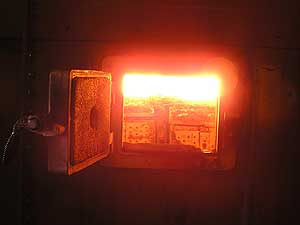|
Audio
Photos
More from MPR
Resources
|
May 11, 2005
The public gets a look at a plan to generate electrical power from wood this week. Municipal Utilities in Hibbing and Virginia are planning to convert two old coal fired power plants. They say the project will be good for the Iron Range economy and good for the environment. But others say there are still environmental costs to harvesting and burning wood.
Virginia, Minn. — They call the venture the Laurentian Energy Project. The electrical power would generate cash for the two communities. And the wood needed could create new jobs in both logging and tree farming.
All this while helping improve the environment by not burning coal - considered a dirty and non-renewable fuel. Proponents say it's a big step forward. Clyde Hanson says it's a big step backwards.
"This is just going back to the 1600s," says Hanson. "This is totally the wrong direction."
Hanson monitors timber issues for the Northstar Chapter of the Sierra Club. Hanson says there are cleaner ways to generate electricity than burning wood. And he says the region's forests can't support a wood-based power industry.
"If we try to solve our energy problems by burning wood, we'll end up denuded of forests like the east coast of the U.S. was even in the 1600s," says Hanson. "So we don't want to go back there again. We have better solutions. We've got wind power. We've got solar power. We've got conservation. We've got much better solutions now. We should be going that direction instead of going backwards."
Proponents say the power plants will rely largely on fast maturing hybrid popal trees, to be planted on former farm land. Otherwise, they'll burn a combination of thinned and undesirable species; tree tops and branches; currently going to waste in the woods. It's the stuff now left behind when a site is logged. But Hanson says even that stuff has value in nature.
"Well, that's a misnomer that there's wood going to waste in our forests," Hanson says. "Wood has a function in (an)ecosystem. It provides habitat and soil nutrients. And if we take it away and burn it we're degrading our forests, harming wildlife, and reducing our wild heritage."
The project commissioned reports on wood availability, wildlife, and soil nutrients, according to Terry Leoni, who heads the Virginia Municipal Utilities. He says there's some 730,000 tons of wood residue available each year within 100 miles of the two cities.
"So if you look at that study, and you look at what we'll be using, we are only using about one sixth of the available resource within a one hundred mile radius of our two plants," Leoni says.
Another report, he says, shows the project will not cause any measurable depletion of nutrients from forest soils.
Michael Noble heads the group Minnesotans for an Energy Efficient Economy, or ME3. Noble says forestry practices and waste wood management issues will need to be monitored. But he says they look manageable.
"I've been privy to conversations between the developers and a lot of the forest advocates," Noble says. "And I'm not saying every single person that's concerned about forestry issues has signed off on this project, but I tell you that there is in general, a lot of good will about what Hibbing and Virginia is proposing."
More importantly, he says, the conversion will reduce carbon dioxide emissions at the two plants. That's the greenhouse gas often blamed for heating up the earth's atmosphere. He says the conversion essentially eliminates carbon dioxide emissions.
"Because the amount of CO2 produced when you burn wood is exactly identical to the CO2 that's absorbed from the atmosphere while the plants are growing," Noble says. "So, biomass energy is regarded as a global warming friendly fuel. So that's actually one of the big, big, environmental plusses here, is the elimination of one of the greenhouse gasses that are changing the climate."
And, Noble likes the idea that the wood will produce steam heat and hot water for businesses and homes in Hibbing and Virginia. So called district energy, is considered more efficient than individual buildings with individual furnaces.
Public meetings will review the project's environmental assessment worksheet and draft air permits. The EAW will help determine whether a more in-depth, environmental impact statement, is necessary.





